What's on Weibo
Hidden Hotel Cameras in Shijiazhuang: Controversy and Growing Distrust
After a Chinese blogger exposed the alarming presence of hidden cameras in hotels, public outrage and mistrust soared about privacy violations and the lack of accountability from local authorities.
Published
1 year agoon
By
Ruixin Zhang
Could it be that someone is watching you while you think you’re all alone in your private hotel room? Without realizing it, some guesthouses or hotels may have hidden cameras secretly recording their guests. This issue has long been a source of concern in China and has recently become a hot topic again.
The Chinese Douyin and Weibo blogger @ShadowsDontLie (@影子不会说谎), an ‘anti-fraud’ influencer, has made it his mission to expose hidden cameras in guesthouses. Over time, he has created several videos with his team, often following tips from his followers, where he searches for these secret cameras—sometimes concealed in the most unexpected places.

Pinhole camera found in plant decoration in hotel room, screenshot of video.
On September 23 of this year, @ShadowsDontLie posted a video in which he exposed hidden cameras in hotels and guesthouses in Shijiazhuang, the capital city of Hebei Province in northern China. In the viral video, the blogger revealed that this wasn’t his first time investigating the issue in Shijiazhuang.
As early as July, he had uncovered hidden cameras at the Huaqiang Plaza (华强广场). However, after hotel staff allegedly pressured him into signing a non-disclosure agreement and local officials became involved, he agreed not to expose the issue, on the condition that the authorities would conduct an internal investigation.

‘Shadows Don’t Lie’ pointing out one of the hidden cameras.
In September, after a tip-off from a follower that the hidden cameras had still not been removed, the blogger returned and livestreamed his search. During the video, he and his colleagues were confronted and even assaulted by individuals who appeared to be associated with the hotel and guesthouse.
The incident garnered widespread attention from netizens, who praised @ShadowsDontLie for his courage and sense of justice. Many were shocked by the boldness and arrogance of the local hotel and guesthouse staff, who, even in the presence of police captured on video, appeared unfazed by the exposure.
“Who knows how deep the corruption runs?”
After the incident went viral, the Shijiazhuang police issued a statement, claiming that the suspects responsible for installing the cameras had been detained and were not connected to the hotel owners, implying the owners’ innocence.
However, this explanation failed to convince the public. In one of the blogger’s videos, a hotel owner can clearly be heard saying, “The camera is only connected to my phone.” What raised even more suspicion was the fact that the owner casually referred to one of the arriving police officers as “Old Zhou” (老周), suggesting a close relationship. This, combined with the apparent cooperation between the police and the owner, deepened the public’s doubts.
Influencer @FrostLeaf (@霜叶) questioned the credibility of the official statements. In his comments section, growing distrust toward local law enforcement was evident. A top comment read, “These days, the official blue background with white text [used in police statements] is just a way to brush you off—what can you do about it?”
As the situation caused an online commotion, @ShadowsDontLie received numerous threats, some of his videos were taken down, and there were even accusations that he had staged the entire incident and had installed the cameras himself.
The incident not only heightened public concern over privacy protection, but it also made people doubt the integrity of the guesthouse industry in Shijiazhuang, which then also impacted other local businesses.
On the 25th, he posted again, revealing that local officials from Shijiazhuang had invited him for a face-to-face meeting. Before attending, he recorded a video disclosing his location, the people accompanying him, and affirming to the public that he would not voluntarily delete any videos—a move that suggested he was preparing for the worst.
After this post, even more netizens expressed concerns for his safety. Comments like “It’s a trap” (“鸿门宴”), “Don’t go, you might not make it back,” and “Who knows how deep the corruption runs” highlighted widespread suspicion. Many believed there was collusion between local hotel businesses and government officials, particularly regarding the hidden camera issue.
Several hours after the blogger’s video about meeting with local officials, he posted yet another update. This time, he issued a public apology on behalf of him and his team to the people of Shijiazhuang, addressing two main points: first, he apologized for any reputational or economic harm his actions may have caused local businesses, and second, for potentially “damaging” the city’s tourism image ahead of the upcoming National Day holiday. He also offered to film promotional videos for Shijiazhuang for free.
However, most commenters felt that @ShadowsDontLie had nothing to apologize for and that it was not his responsibility to protect the image of Shijiazhuang’s hospitality industry. Others believed the statement from the blogger and his team was simply the result of pressure from local authorities. One person commented, “So, silencing the person who raised the issue means there’s no issue anymore?”
“China’s version of South Korea’s infamous ‘Nth Room’ scandal”
Besides the concerns over the vigilante blogger, the issue of hidden cameras in hotels itself continues to spark outrage.
According to a report shared by China Kandian, a former guesthouse owner revealed the existence of a black market for illicit filming since at least as early as 2017. She explained that many guesthouse owners intentionally install hidden cameras during renovations and stream the footage to the cloud. Some owners reportedly earn five-figure incomes daily by selling video clips or granting access to live streams.
Others in the industry have exposed how profits from live streaming far exceed revenue from room bookings. These guesthouses often lure guests with appealing décor and low rates, only to profit from hidden camera footage. When caught, they typically claim the cameras were installed by guests.
These claims are not baseless. Blogger Li Chunji (@北国佳人李春姬) has compiled numerous reports over the years of hidden cameras being found in hotels and the sale of such footage, with cases reported across China. She even discovered livestreaming platforms outside China’s firewall that advertised “hotel peep cams” and “surveillance videos.”
Similarly, influencer @Xianzi (@弦子与她的朋友们) received a tip-off and uncovered a website featuring live streams from guesthouses and hotels in China. The site not only offered “real-time surveillance” but also “replays,” which left many people horrified. Some have compared this to China’s version of South Korea’s infamous “Nth Room” scandal, which involved criminals who blackmailed victims (including minors), into making sexually exploitative videos to sell on Telegram between 2018 and 2020.

Example of hidden camera streams.
In response to the public’s panic and anger, the government’s indifferent reaction, lenient penalties, and lack of clear accountability have only fueled further anxiety.
Online discussions have surged under hashtags like “Will You [Still] Stay In A Guesthouse During National Day?” (#国庆出游还住民宿吗#), along with tips on how to check for hidden cameras.
However, as public welfare influencer @BuGuoJun (@补果君) pointed out, “We shouldn’t have to keep teaching people how to detect hidden cameras. Instead, we should be asking how to shut down all hotels with hidden cameras.”
For many citizens, however, who are increasingly turning to grassroots justice rather than relying on official channels, this may seem like an idealistic dream.
Beneath these discussions—whether viewed as public paranoia or a reflection of reality—there remains a deep mistrust of local authorities. This is why many people place their faith in grassroots “vigilantes” like @ShadowsDontLie rather than the city police to seek justice.
In the comment sections of his posts, countless netizens expressed their gratitude for his efforts. Despite the threats and pressure he faced, one comment summed up the public’s sentiment: “We should be thanking you instead.”
By Ruixin Zhang
Independently reporting China trends for over a decade. Like what we do? Support us and get the story behind the hashtag by subscribing:
edited for clarity by Manya Koetse
Spotted a mistake or want to add something? Please let us know in comments below or email us. First-time commenters, please be patient – we will have to manually approve your comment before it appears.
©2024 Whatsonweibo. All rights reserved. Do not reproduce our content without permission – you can contact us at info@whatsonweibo.com.
Ruixin is a Leiden University graduate, specializing in China and Tibetan Studies. As a cultural researcher familiar with both sides of the 'firewall', she enjoys explaining the complexities of the Chinese internet to others.

You may like
China Brands, Marketing & Consumers
Signals: Hasan Piker’s China Trip & the Unexpected Journey of a Chinese School Uniform to Angola
Hasan Piker’s controversial China tour, a Chinese school uniform resurfaces in Africa, a new winter hotspot, why Chinese elites ‘run’ to Tokyo, and more.
Published
1 week agoon
November 21, 2025
🌊 Signals — Week 47 (2025)
Part of Eye on Digital China, Signals highlights slower trends and online currents behind the daily scroll. This edition was sent to paid subscribers — subscribe to receive the next issue in your inbox.
Welcome to another edition of Eye on Digital China. Different from the China Trend Watch (check the latest one here if you missed it), this edition, part of the new Signals series, is about the slower side of China’s social media: the recurring themes and underlying shifts that signal broader trends beyond the quick daily headlines. Together with the deeper dives, the three combined aim to give you clear updates and a fuller overview of what’s happening in China’s online conversations & digital spaces.
For the coming two weeks, I’ll be traveling from Beijing to Chongqing and beyond (more on that soon) so please bear with me if my posting frequency dips a little. I’ll be sure to pick it up again soon and will do my best to keep you updated along the way. In the meantime, if you know of a must-try hotpot in Chongqing, please do let me know.
In this newsletter: Hasan Piker’s controversial China tour, a Chinese school uniform in Angola, a new winter hotspot, discussions on what happens to your Wechat after you die, why Chinese elites rùn to Tokyo, and more. Let’s dive in.
- 💰 The richest woman in China, according to the latest list by Hurun Research Institute, is the “queen of pharmaceuticals” Zhong Huijuan (钟慧娟) who has accumulated 141 billion yuan (over 19 billion USD). Women account for over 22% of Chinese billionaires (those with more than 5 billion RMB), underscoring China’s globally leading position in producing wealthy female entrepreneurs.
- 🧩 What happens to your WeChat after you die? A user who registered for NetEase Music with a newly reassigned phone number unexpectedly gained access to the late singer Coco Lee’s (李玟) account, as the number had originally belonged to her. The incident has reignited debate over how digital accounts should be handled after death, prompting platforms like NetEase and Tencent to reconsider policies on long-inactive accounts and take stronger measures to protect them.
- 📱 Although millions of viewers swoon over micro-dramas with fantasy storylines where rich, powerful men win over the “girl next door” through money and status, Chinese regulators are now stepping in to curb exaggerated plots featuring the so-called “dominant CEO” (霸道总裁) archetype, signaling stricter oversight for the booming short drama market.
- ☕ A popular Beijing coffee chain calling itself “People’s Cafe” (人民咖啡馆), with its style and logo evoking nationalist visual nostalgia, has changed its name after facing criticism for building its brand – including pricey coffee and merchandise – on Mao era and state-media political connotations. The cafe is now ‘Yachao People’s Cafe’ (要潮人民咖啡馆).
- 👀 Parents were recently shocked to see erotic ads appear on the Chinese nursery rhymes and children’s learning app BabyBus (宝宝巴士), which is meant for kids ages 0–8. BabyBus has since apologized, but the incident has sparked discussions about how to keep children safe from such content.
- 🧧The 2026 holiday schedule has continued to be a big topic of conversation as it includes a 9-day long Spring Festival break (from February 15 to February 23), making it the longest Lunar New Year holiday on record. The move not only gives people more time for family reunions, but also gives a huge boost to the domestic travel industry.
Hasan Piker’s Chinese Tour & The US–China Content Honeymoon
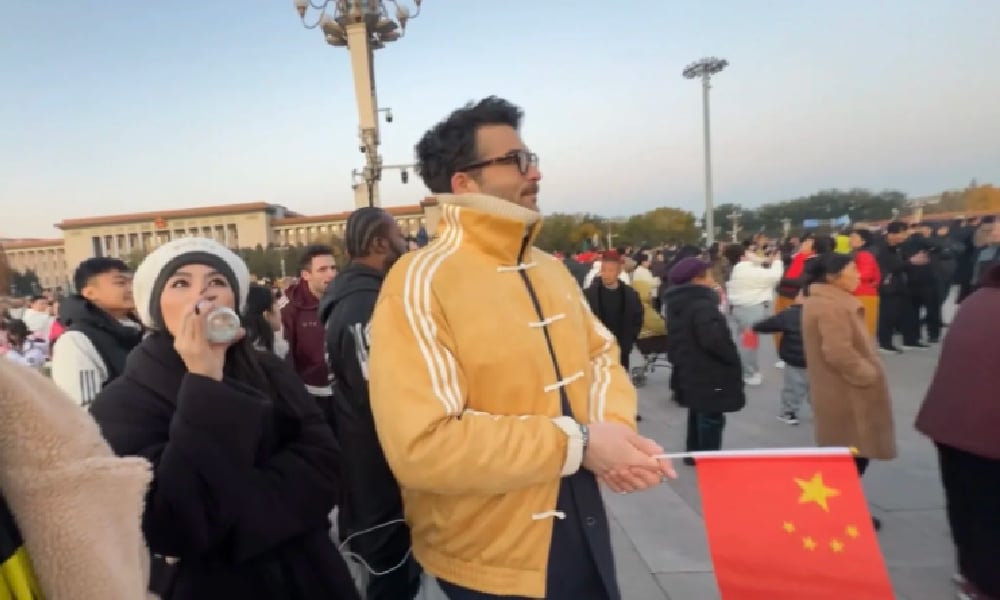
Livestreamer Hasan Piker during his visit to Tiananmen Square flag-rising ceremony.
It’s not time for the end-of-year overviews just yet – but I’ll already say that 2025 was the US–China ‘honeymoon’ year for content creation. It’s when China became “cool,” appealing, and eye-grabbing for young Western social media users, particularly Americans. The recent China trip of the prominent American online streamer Hasan Piker fits into that context.
This left-wing political commentator also known as ‘HasanAbi’ (3 million followers on Twitch, recently profiled by the New York Times) arrived in China for a two-week trip on November 11.

Piker screenshot from the interview with CGTN, published on CGTN.
His visit has been controversial on English-language social media, especially because Piker, known for his criticism of America (which he calls imperialist), has been overly praising China: calling himself “full Chinese,” waving the Chinese flag, joining state media outlet CGTN for an interview on China and the US, and gloating over a first-edition copy of Quotations from Chairman Mao (the Little Red Book). He portrays China as heavily misrepresented in the West and as a country the United States should learn from.

Hasan Piker did an interview with CGTN, posing with Li Jingjing 李菁菁.
During his livestreaming tour, Hasan, who is nicknamed “lemonbro” (柠檬哥) by Chinese netizens, also joined Chinese platforms Bilibili and Xiaohongshu.
But despite all the talk about Piker in the American online media sphere, online conversations, clicks, and views within China are underwhelming. As of now, he has around 24,000 followers on Bilibili, and he’s barely a topic of conversation on mainstream feeds.
Piker’s visit stands in stark contrast to that of American YouTuber IShowSpeed (Darren Watkins), who toured China in March. With lengthy livestreams from Beijing to Chongqing, his popularity exploded in China, where he came to be seen by many as a representative of cultural diplomacy.

IShowspeed in China, March 2025.
IShowSpeed’s success followed another peak moment in online US–China cultural exchange. In January 2025, waves of foreign TikTok users and popular creators migrated to the Chinese lifestyle app Xiaohongshu amid the looming TikTok ban.
Initially, the mass migration of American users to Xiaohongshu was a symbolic protest against Trump and US policies. In a playful act of political defiance, they downloaded Xiaohongshu to show they weren’t scared of government warnings about Chinese data collection. (For clarity: while TikTok is a made-in-China app, it is not accessible inside mainland China, where Douyin is the domestic version run by the same parent company).
The influx of foreigners — who were quickly nicknamed “TikTok refugees” — soon turned into a moment of cultural celebration. As American creators introduced themselves, Chinese users welcomed them warmly, eager to practice English and teach newcomers how to navigate the app. Discussions about language, culture, and societal differences flourished. Before long, “TikTok refugees” and “Xiaohongshu natives” were collaborating on homework assignments, swapping recipes, and bonding through humor. It was a rare moment of social media doing what we hope it can do: connect people, build bridges, and replace prejudice with curiosity.
Some of that same enthusiasm was also visible during IShowSpeed’s China tour. Despite the tour inevitably getting entangled with political and commercial interests, much of it was simply about an American boy swept up in the high energy of China’s vibrant cities and everything they offer.
Different from IShowSpeed, who is known for his meme-worthy online presence, Piker is primarily known for his radical political views. His China enthusiasm feels driven less by cultural curiosity and more by his critique of America.
Because of his stances — such as describing the US as a police state — it’s easy for Western critics to accuse him of hypocrisy in praising China, especially after a brief run-in with security police while livestreaming at Tiananmen Square.
Seen in broader context, Piker’s China trip reflects a shift in how China is used in American online discourse.
Before, it was Chinese ‘public intellectuals’ (公知) who praised the US as a ‘lighthouse country’ (灯塔国), a beacon of democracy, to indirectly critique China and promote a Western modernization model. Later, Chinese online influencers showcased their lives abroad to emphasize how much ‘brighter the moon’ was outside China.
In the post-Covid years, the current reversed: Western content creators, from TikTok influencers to political commentators, increasingly use China to make arguments that are fundamentally about America.
Between these cycles, authentic cultural curiosity gets pushed to the sidelines. The TikTok-refugee moment in early January may have been the closest we’ve come in years: a brief window where Chinese and American users met each other with curiosity, camaraderie, and creativity.
Hasan’s tour, in contrast, reflects a newer phase, one where China is increasingly used as a stage for Western political identity rather than a complex and diverse country to understand on its own terms. I think the honeymoon phase is over.
“Liu Sihan, Your School Uniform Ended Up in Angola”: China’s Second-Hand Clothing in Africa

A Chinese school uniform went viral after a Chinese social media user spotted it in Angola.
“Liu Sihan, your schooluniform is hot in Africa” (刘思涵你的校服在非洲火了) is a sentence that unexpectedly trended after a Chinese blogger named Xiao Le (小乐) shared a video of a schoolkid in Angola wearing a Chinese second-hand uniform from Qingdao Xushuilu Primary School, that had the nametag Liu Sihan on it.
The topic sparked discussions about what actually happens to clothing after it’s donated, and many people were surprised to learn how widely Chinese discarded clothing circulates in parts of Africa.
Liu Sihan’s mother, whose daughter is now a 9th grader in Qingdao, had previously donated the uniform to a community clothing donation box (社区旧衣回收箱) after Liu outgrew it. She intended it to help someone in need, never imagining it to travel all the way to Africa.
In light of this story, one netizen shared a video showing a local African market selling all kinds of Chinese school items, including backpacks, and people wearing clothing once belonging to workers for Chinese delivery platforms. “In Africa, you can see school uniforms from all parts of China, and even Meituan and Eleme outfits,” one blogger wrote.
When it comes to second-hand clothing trade, we know much more about Europe–Africa and US–Africa flows than about Chinese exports, and it seems there haven’t been many studies on this specific topic yet. Still, alongside China’s rapid economic transformations, the rise of fast fashion, and the fact that China is the world’s largest producer and consumer of textiles, the country now has an enormous abundance of second-hand clothing.
According to a 2023 study by Wu et al. (link), China still has a long way to go in sustainable clothing disposal. Around 40% of Chinese consumers either keep unwanted clothes at home or throw them away.
But there may be a shift underway. Donation options are expanding quickly, from government bins to brand programs, and from second-hand stores to online platforms that offer at-home pickup.
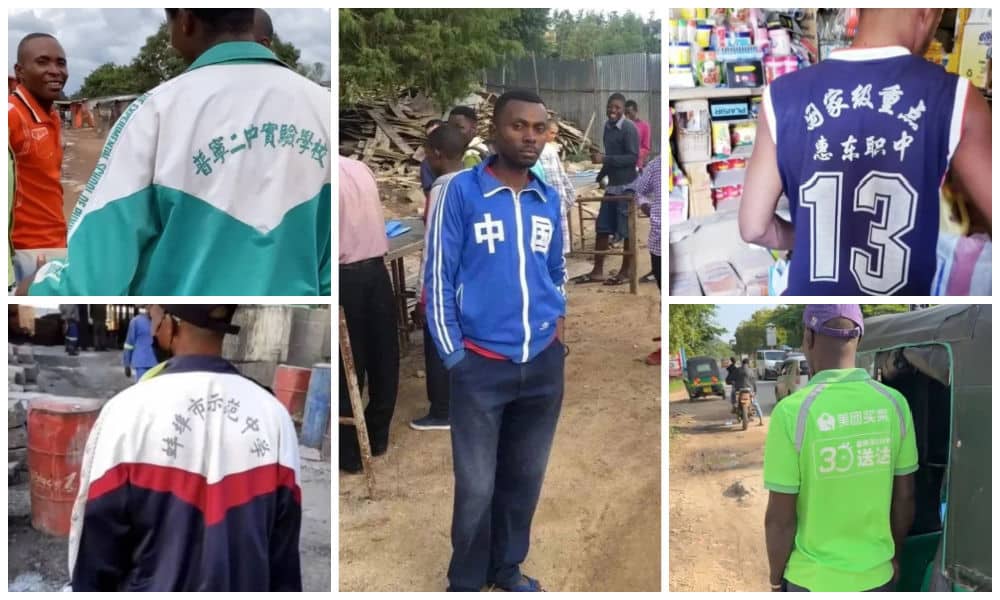
Chinese social media users posting images of school/work uniforms from China worn by Africans.
As awareness grows around the benefits of donating clothing (reducing waste, supporting sustainability, and the emotional satisfaction of giving), donation rates may rise significantly. The story of Liu Sihan’s uniform, which many found amusing, might even encourage more people to donate. And if that happens, scenes of African children (and adults) wearing Chinese-donated clothes may become much more common than they now are.
Laojunshan: New Hotspot in Cold Winter

Images from Xiaohongshu, 背包里的星子, 旅行定制师小漾
Go to Zibo for BBQ, go to Tianshui for malatang, go to Harbin for the Ice Festival, cycle to Kaifeng for soup dumplings, or head to Dunhuang to ride a camel — over recent years, a number of Chinese domestic destinations have turned into viral hotspots, boosted by online marketing initiatives and Xiaohongshu influencers.
This year, Laojunshan is among the places climbing the trending lists as a must-visit spot for its spectacular snow-covered landscapes that remind many of classical Chinese paintings. Laojunshan (老君山), a scenic mountain in Henan Province, is attracting more domestic tourists for winter excursions.
Xiaohongshu is filled with travel tips: how to get there from Luoyang station (by bus), and the best times of day to catch the snow in perfect light (7–9 AM or around 6–6:30 PM).
With Laojunshan, we see a familiar pattern: local tourism bureaus, state media, and influencers collectively driving new waves of visitors to the area, bringing crucial revenue to local industries during what would otherwise be slower winter months.
WeChat New Features & Hong Kong Police on Douyin
🟦 WeChat has been gradually rolling out a new feature that allows users to recall a batch of messages all at once, which saves you the frantic effort of deleting each message individually after realizing you sent them to the wrong group (or just regret a late-night rant). Many users are welcoming the update, along with another feature that lets you delete a contact without wiping the entire chat history. This is useful for anyone who wants to preserve evidence of what happened before cutting ties.
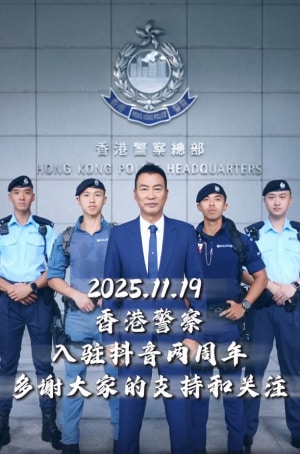
🟦The Hong Kong Police Force recently celebrated its two-year anniversary on Douyin (the Chinese version of TikTok), having accumulated nearly 5 million followers during that time. To mark the occasion, they invited actor Simon Yam to record a commemorative video for their channel (@香港警察). The presence of the Hong Kong Police on the Chinese app — and the approachable, meme-friendly way they’ve chosen to engage with younger mainland audiences — is yet another signal of Hong Kong institutions’ strategic alignment with mainland China’s digital infrastructure, a shift that has been gradually taking place. The anniversary video proved popular on Douyin, attracting thousands of likes and comments.
Why Chinese Elite Rùn to Japan (by ChinaTalk)
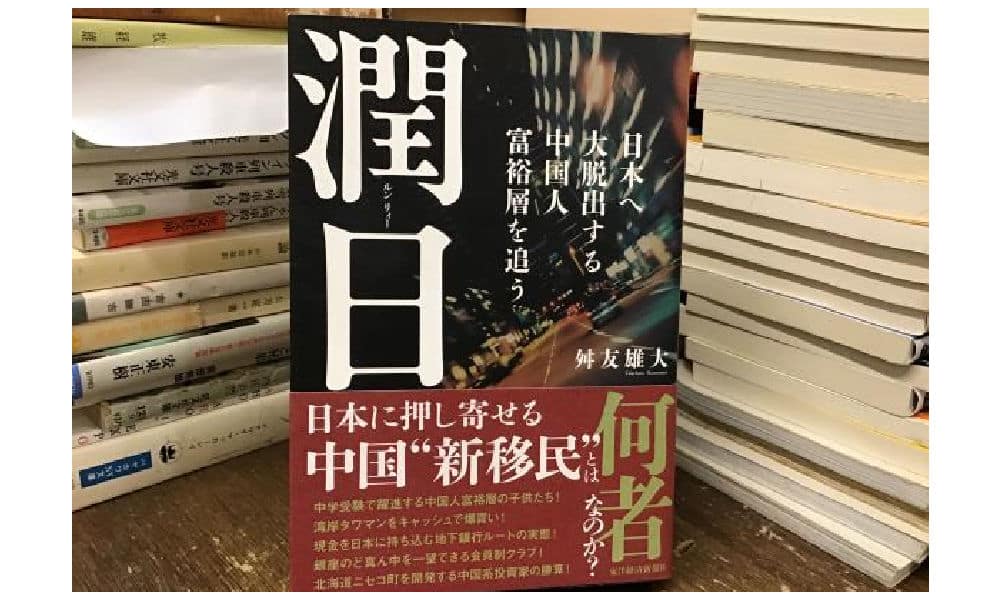
Over the past week, Japan has been trending every single day on Chinese social media in light of escalating bilateral tensions after Japanese PM Takaichi made remarks about Taiwan that China views as a direct military threat. The diplomatic freeze is triggering all kinds of trends, from rising anti-Japanese sentiment online and a ban on Japanese seafood imports to Chinese authorities warning citizens not to travel to Japan.
You’d think Chinese people would want to be anywhere but Japan right now — but the reality is far more nuanced.
In a recent feature in ChinaTalk, Jordan Schneider interviewed Japanese journalist & researcher Takehiro Masutomo (舛友雄大) who has just published a book about Japan’s new Chinese diaspora, explaining what draws Chinese dissidents, intellectuals, billionaires, and middle-class families to Tokyo.
The book is titled Run Ri: 潤日 Following the Footsteps of Elite Chinese Escaping to Japan (only available in Japanese and Traditional Chinese for now). (The word Rùn 润/潤, by the way, is Chinese online slang and meme expresses the desire to escape the country.)
A very interesting read on how Chinese communities are settling in Japan, a place they see as freer than Hong Kong and safer than the U.S., and one they’re surprisingly optimistic about — even more so than the Japanese themselves.
Thanks for reading this Eye on Digital China Signals. For fast-moving trends and deeper dives, keep an eye on the upcoming newsletters.
And if you just so happen to be reading this without a subscription and appreciate my work, consider joining to receive future issues straight in your inbox.
A small housekeeping note:
This Eye on Digital China newsletter is co-published for subscribers on both Substack and the main site. If you’re registered on both platforms, you’ll receive duplicate emails — so if that bothers you, please pick your preferred platform and unsubscribe from the other.
Many thanks to Miranda Barnes for helping curate some of the topics in this edition.
— Manya
Spotted an error or want to add something? Comment below or email me.
First-time commenters require manual approval.
©2025 Eye on Digital China / What’s on Weibo. Do not reproduce without permission —
contact info@whatsonweibo.com.
China Trend Watch
China Trend Watch: Japan Tensions, Nexperia Fallout, Yunnan’s ‘Wild Child,’ & “Modern Opium”
From quick scrolls to the discussions that matter, these are the topics trending in China this week.
Published
2 weeks agoon
November 16, 2025
🔥 China Trend Watch — Week 45-46 (2025)
Part of Eye on Digital China. This edition was sent to paid subscribers — subscribe to receive the next issue in your inbox.
Welcome to the Eye on Digital China newsletter. It has been an especially tumultuous week on Chinese social media: from the crisis triggered by Takaichi’s remarks to the Nexperia clash and the near-total blackout surrounding the Yunnan “wild child” case. Despite their differences, all of these stories share a common thread — mistrust, whether on the geopolitical stage or at home in institutions and state media.
Thank you for the kind reactions I received after the last newsletter, in which I took a bird’s-eye view of China’s evolving social media landscape and announced a soft goodbye to What’s on Weibo (if you haven’t read it yet, you can find it here).
I’m very grateful to everyone who has followed my journey with What’s on Weibo, and I’m excited to start this new chapter together.
Under the Eye on Digital China newsletter, you can expect updates in three categories: fast-moving trends, slower-burn signals, and longer thematic explorations — plus the occasional personal story, including from the road as I travel through China. (I’ll soon be covering roughly 3,000 miles across the country, so I’m sure I’ll run into plenty worth sharing.)
This is the China Trend Watch edition — a quick catch-up on real-time conversations. Let’s dive in.
- 🔺 A new 32-country survey by The Economist and GlobeScan found a sharp increase in the share of respondents who prefer China over the US as the world’s “leading power,” and younger people are driving much of this shift.
- 🛵 As Ele.me (China’s No.2 food-delivery platform) rebrands to “Taobao Flash Delivery” (淘宝闪购), competitor Meituan used it as the perfect marketing moment by bidding farewell to its long-time competitor with a virtual “memorial service,” complete with “farewell coupons.”
- 👀 Famous Chinese author and Nobel laureate Mo Yan (莫言) made his debut on the social media app Xiaohongshu this week, with a meme-ready video and posts. He’s been praised as a “meme king” for quickly adapting to the app’s community — gaining over 950,000 followers in just five days.
- 🏳️🌈 Two of China’s most popular gay apps, Blued and Finka (翻咔), have been removed from from Apple App Store in China as at the request of Chinese internet regulatory authorities. Last month, Blued – which has over 40 million registered users in China – temporarily suspended new user registrations after media reports accused the platform of facilitating encounters that led to HIV infections among minors.
- 🏆 A remarkable moment during the Golden Rooster Awards went viral after Ne Zha 2 won the award for Best Art Film — yet no one came to pick it up. Director Jiaozi (饺子) had already announced earlier in the year that he and his entire team would be too busy working on Ne Zha 3 to attend any events — and he, very clearly, is a man of his word.
- 🔻 Chinese-Canadian celebrity Kris Wu (吴亦凡), convicted in 2022 for rape and sentenced to 13 years in prison, keeps reappearing in online discussions — but only through rumors. This week, speculation about his possible death in prison spread across social media yet again (“What, did he die again?” some joked). Local authorities have denied the rumors.
1. Sino-Japanese Tensions Escalate After Takaichi’s Taiwan Remarks

Political cartoon circulating on Chinese social media, made by Jun Zhengping (钧正平), official social media name/persona used by the People’s Liberation Army.
With the recent appointment of conservative politician Sanae Takaichi (高市早苗) as the new prime minister of Japan, seen as the ideological successor to Shinzo Abe, many expected renewed Sino-Japanese tensions due to her stances on various sensitive bilateral issues, from wartime history to Taiwan. But perhaps few expected relations to escalate so quickly and so intensely.
This week, Japan and Takaichi have been top trending topics after she made provocative remarks during a hearing in the Diet about potential military intervention in Taiwan-related matters, suggesting Japan’s Self-Defense Forces could exercise the right of collective self-defense if such a situation were recognized as “survival-threatening.” She is also pushing defense-related policy changes, including exploring revisions to Japan’s “three non-nuclear principles.”
The remarks have set off a chain of events — and online trends — marking what may be the worst flare-up in ties since 2012, when major anti-Japanese protests erupted in China following Japan’s purchase of the disputed Senkaku/Diaoyu Islands. Chinese officials are sharpening their tone, issuing angry and escalatory diplomatic statements via X, domestic social media, and Foreign Ministry press briefings.
The recent escalations have also led to official warnings about safety risks for Chinese nationals in Japan. On Sunday, China’s Ministry of Education advised Chinese citizens to exercise caution when planning study-abroad arrangements in Japan.
Beyond nationalist discourse and general anti-Japanese sentiment on Chinese social media — and users vowing not to travel or study there — many discussions are also focusing on geopolitics and history rather than consumer boycotts. Well-known nationalist knowledge blogger Pingyuan Gongzi Zhao Sheng (@平原公子赵胜) posted a lengthy post on Weibo (crossposted to Xiaohongshu) suggesting that Japan is filled with ‘deadly energy’ (死气 sǐqì) – acting irrationally and aggressively because it is in complete decline — socially, economically, technologically, and militarily — but unable to accept it. He argues that a strong and stable country would never gamble its future like this, and that only a “zombie-like” nation in denial would provoke China unnecessarily. A related hashtag about Japan’s gloomy status-quo (#日本死气#) has also been used by other commentators across social media.
2. New Updates in Yunnan’s “Wild Child” Case Raise More Questions

Last month, I wrote about a distressing case involving a 3-year-old boy from Nanjian County (南涧县) in Yunnan who was seen walking on all fours, behaving dog-like with possible spinal deformities, naked and apparently neglected by his parents. Several netizens recorded the scene, and videos quickly spread online in mid October, with thousands referring to the boy as the “wild child” (野孩子 or “naked child” 赤裸小孩) of Yunnan and demanding that authorities intervene and hold the parents accountable.
What followed was a wave of confusing — and sometimes contradictory — media reports. Some outlets initially claimed the boy’s parents were impoverished and struggling, while others reported they were well-educated and financially stable, framing their dubious parenting approach as a deliberate and philosophical “lifestyle choice.”
The parents, who live a camper-van lifestyle, turned out to both hold university degrees (the mother even holds a post-graduate degree). They claimed they practice “natural education” (自然教育法) and said their son disliked wearing clothes because of eczema. Some reports said they refused to cooperate with local authorities; others said they agreed to stop letting their child crawl around naked. Neither the 3-year-old nor his younger brother had ever been registered for a household hukou (registered permanent residence), raising further concern.
Online, speculation intensified. Many netizens feared the child was being deliberately mistreated for profit, suggesting a dark-web content industry behind the scenes.
This week, local authorities and state media posted a new update, releasing a video of the boy — referred to as Pingping (平平, an alias) — walking and playing normally. According to officials, the parents are now receiving support and guidance in raising their children, and both boys are being issued official household registrations by local authorities. The investigation, they said, found no evidence that the parents were involved in “illegal online profit-making.”
But many netizens are anything but convinced. They argue the child shown in the video isn’t the same boy — his face is blurred, and his voice appears overdubbed. Posts questioning the official narrative are being censored. And although authorities say the case is now closed, with the family under ongoing guidance, many people online feel the story is anything but over, and that the real truth still hasn’t surfaced.
Some of the doubts about the veracity of the story and videos are being expressed in more subtle ways to avoid censorship. One Weibo commenter simply wrote that “mild spinal deformities in a 3-year-old may improve within 3–6 months through corrective treatment (…) while recovery from severe deformities may take 1–2 years or even longer” — subtly suggesting that it would be impossible for the boy to be walking and playing normally now if he had shown signs of spinal deformity just weeks earlier. On Douyin, users also questioned what happened to the supposedly severe eczema that had allegedly prevented the boy from wearing clothes. A Zhihu writer expressed frustration: “The official report is extremely fake, but there’s no way to talk about it.” Another commenter echoed the sentiment: “People today aren’t stupid. Even if you forbid them to speak, do you think they won’t know something is wrong?” For many, the case is troubling not only because of the child’s situation, but because the official handling of it has reinforced a growing sense that the public is being managed rather than informed.
3. Nexperia and Dutch ‘Pirate Gene’ Discussions

It wasn’t just bilateral relations with Japan that took a hit this week — tensions between China and the Netherlands have also deepened due to the ongoing dispute surrounding Dutch intervention in the chipmaker Nexperia. This is an issue I wrote about last month. After the incident made international headlines, China responded by blocking the export of Nexperia chips from its factory in China, putting major European automakers at risk of running short on critical components for vehicle electronics.
In brief: Nexperia (安世半导体), a Dutch semiconductor company based in Nijmegen and wholly owned by the Chinese conglomerate Wingtech (闻泰科技) since 2019, became the center of a major diplomatic clash after the Dutch government reportedly ordered a one-year freeze on strategic and governance changes within the company on September 30. Citing national security concerns and a desire to secure domestic chip production, the Dutch move came amid reports that Nexperia CEO Zhang Xuezheng was relocating production facilities and sensitive technology from Europe to China.
While tensions had previously seemed to ease, the conflict escalated again this week. The Dutch public broadcasting organization reported on a widening rift as Nexperia China accused the Dutch branch of disrupting production by refusing to send chip components to the Dongguan factory. Meanwhile, Nexperia Netherlands claimed the Chinese side had been urging customers to reroute payments away from the Netherlands and into Chinese bank accounts. A Dutch delegation is expected to travel to Beijing next week to discuss the situation and attempt to break the deadlock.
On Chinese social media, many users view the Dutch actions as an unfair use of a Cold-War-era law to target a modern, legally operating multinational company. The move is widely seen as another example of Western countries shifting rules to maintain technological dominance when faced with strong competition from Chinese firms. As a result, what began as a company-specific dispute has grown into a broader geopolitical struggle over global chip control and economic sovereignty.
Modern Opium [当代鸦片] (dāngdài yāpiàn)

Over the past year, the term “modern opium” has become more common on Chinese social media— used as a popular term to promote food or other products. It’s perhaps not unlike the famous “finger-licking good” slogan in the West, but applied far more broadly, also to refer to “addictive” online accounts, collector toys, or restaurants. In fact, it has become so commonplace that you can now find “modern-opium food recommendation” suggestions on platforms when searching for good places to eat in major Chinese cities.
Recently, the term began trending as a controversial expression after Chinese media focused on an official online complaint arguing that it “turns national trauma into entertainment” (将民族伤痛娱乐化) and trivializes a painful chapter of Chinese history, drawing a direct connection to the Opium Wars (1839–1842 and 1856–1860).
The complaint has put the term at the center of public attention — but how controversial is it, really? While Chinese media are eager to highlight how inappropriate the phrase is, given China’s collective memory of the “century of humiliation,” many Xiaohongshu users nevertheless seem to think it’s perfectly acceptable to describe their newfound addiction to a milky drink, a sweet dessert, or the perfect hotpot. (I can relate to the latter.)

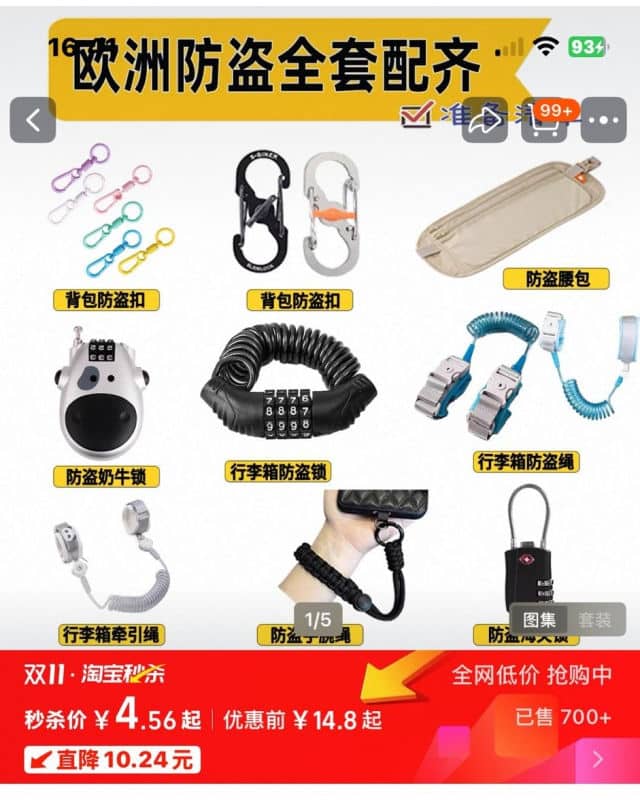
During this year’s Single’s Day Shopping Festival (11.11), “Europe” was a popular item on shopping lists, not for its fashion or chocolate, but for anti-theft tools. Using “Europe is not safe” slogans and real footage of pickpockets in action, hundreds of Taobao sellers promoted handy anti-theft accessories for Chinese tourists traveling abroad, some even labeled for specific countries, from Spain to Germany.
This year’s shopping festival reportedly generated 1.695 trillion RMB ($238B) across platforms — still up 14.2% year-on-year, but with far slower growth than in previous years (2024: 26.6% growth). Jing Daily noted a noticeably more negative social media vibe surrounding the festival, with young consumers on Xiaohongshu growing more skeptical and questioning its purpose. Gen Z users are prioritizing timeless purchases over trend cycles and embracing more practical spending (like gadgets to avoid getting robbed in Europe).
Thanks for reading this Eye on Digital China China Trend Watch. For slower-moving trends and deeper structural analysis, keep an eye on the upcoming newsletters.
And if you happen to be reading this without a subscription and appreciate my work, consider joining to receive future issues straight in your inbox.
Many thanks to Miranda Barnes for helping curate some of the topics in this edition.
— Manya
Spotted an error or want to add something? Comment below or
email me.
First-time commenters require manual approval.
©2025 Eye on Digital China / What’s on Weibo. Do not reproduce without permission —
contact info@whatsonweibo.com.
Subscribe
Eye on Digital China is a reader-supported publication by
Manya Koetse (@manyapan) and powered by What’s on Weibo.
It offers independent analysis of China’s online culture, media, and social trends.
To receive the newsletter and support this work, consider
becoming a paid subscriber.

Get in touch
Have a tip, story lead, or book recommendation? Interested in contributing? For ideas, suggestions, or just a quick hello, reach out here.

Signals: Hasan Piker’s China Trip & the Unexpected Journey of a Chinese School Uniform to Angola

About Eye on Digital China — Powered by What’s on Weibo

China Trend Watch: Japan Tensions, Nexperia Fallout, Yunnan’s ‘Wild Child,’ & “Modern Opium”

Eye on Digital China: How Chinese Social Media Evolved from the Blog Era to the AI-driven Age

Trump and Takaichi: The Unexpected Love Affair

The Wong Kar-wai Scandal Explained: The Dark Side of ‘Blossoms Shanghai’

From Schadenfreude to Sympathy: Chinese Online Reactions to Charlie Kirk Shooting

From Nobel Farewell to ‘VIP Toilets’: What’s Trending in China

From Tents to ‘Tangping Travel”: New Travel Trends among Young Chinese

China’s “Post Parade Afterglow”: 6 Social Media Trends
Popular Reads
-

 China Memes & Viral4 months ago
China Memes & Viral4 months agoHidden Cameras and Taboo Topics: The Many Layers of the “Nanjing Sister Hong” Scandal
-

 China Insight7 months ago
China Insight7 months agoUnderstanding the Dr. Xiao Medical Scandal
-

 China Memes & Viral11 months ago
China Memes & Viral11 months agoOur Picks: Top 10 Chinese Buzzwords and Phrases of 2024 Explained
-

 China Digital10 months ago
China Digital10 months ago“Dear Li Hua”: The TikTok/Xiaohongshu Honeymoon Explained



